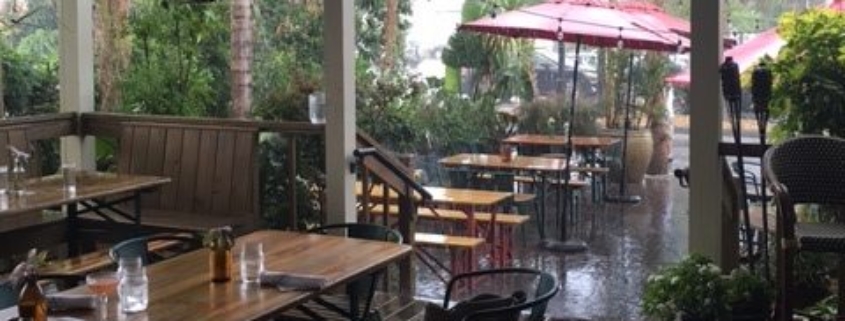In Service of Writing
The restaurant buzzes. She might as well be on Mars. / Where did it all go wrong?
~John Berryman, “Dream Song 4”
Next year I will turn forty. Thirty-nine feels dire some days, at the edge of oblivion. I walked away from my career last year to start grad school and focus on writing, and now I work part-time in a restaurant as a server, like I did in my teens and twenties. I’m good at it—the timing, the charming repartee with my customers. At twenty-six, I was ready to be done waiting tables, done waiting. In those days, I’d look at the older servers, in their thirties or forties, and think, just kill me if I become an old waitress.
At that time, restaurant jobs had already served me well for thirteen years, half my life. Service jobs allowed me to move around: to Los Angeles, Chicago, and Maine. I made good money and fantastic friendships forged in endless side work, little sleep, Sunday brunch marathons, and getting stoned under the stairs on smoke break. Service jobs meant I could take classes at the schools I wanted to attend, earning credits from undergraduate programs across the country. I got around. And I learned an employable skill that does not outdate. But I always considered it temporary, a means to an end.
* * *
When I left restaurant service in my twenties, it seemed like my job choices were fated, each one a valuable step on a career path. When my husband and I moved to rural Vermont in 2003, we somehow both found work and a place to live over one weekend’s visit. I found my job in the local classifieds: barn help, mornings, four hours a day, Monday thru Friday.
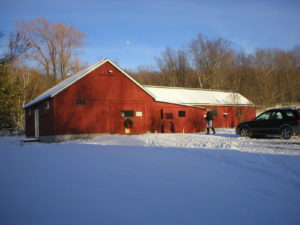
VT Winter, credit: Katelyn Keating
This would be the best job of my life. For one year, my daily grind was to care for horses. The Zen of cleaning something intended to be dirtied again spoke to me. While cleaning a stall, listening to NPR in the background, I was often inspired to write. I composed and edited opening sentences, incubated ideas while I banked shavings and scrubbed water buckets. The physical work was muscle memory from a childhood steeped in horsemanship. I would have done this job forever, but the business moved. My employer was finally able to fulfill a dream to buy her own farm, and moved too far for me to follow.
A few months later, I graduated with my humanities BA and felt that pull of fate again, when I saw a job posting for a new equine hospital: horsemanship required, no medical background necessary. Maybe it was a calling. With my years of caring for damaged animals, I would go into medicine. It was awesome work—the soothing routine of horse care, plus sometimes saving lives—but the physicality was terrible on the body. My back broke down, my neck broke down, and after five years and a cross-country move, I advanced into veterinary practice management—that sad office in the back of the hospital where we settled scheduling disputes, and managed inventory, and went weeks without laying hands on an animal. It’s often compassion fatigue that forces a person out of a veterinary hospital, but that wasn’t it for me. It was more like insidious aspiration. I launched a LinkedIn account: I was a woman with a career in veterinary medicine, and career people climb. Right? And so, after another cross-country move, I climbed up into veterinary pharmaceutical sales.
To get that territory—company car, travel, autonomy—one must first pay her dues with inside sales. I wore business casual from Banana Republic Factory Store and sat in a drafty cube under UV lights. Some days I made two hundred phone calls. At home, I could barely talk. This was the worst job of my life, the first time creativity was excluded from my work. After only eighteen months in sales, it was time to make a big change, in the form of a low-residency MFA program that accepted me even though I applied three months late.
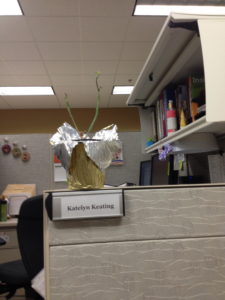
Cube, credit: Katelyn Keating
With my loss of income and our monolithic debt in mind, my husband and I humbled ourselves and asked for help. We gave up our 1906 two-story Craftsman with hardwoods and a fenced backyard and moved in with my parents in Florida, our five pets in tow. And I got a great restaurant job.
When school started, being immersed in ideas and words again felt important, a ritual rediscovered. I experienced that rush in a seminar when an idea sparks with another from an earlier seminar, or a book on another subject, and a new idea is born in the intersection. I remembered the feeling, and craved the feeling. Then partway through my first term, I became suddenly preoccupied with my future career. The insidious aspiration reared its head. People started asking, and then I started asking: What will I do with this degree?
* * *
As someone who generally spreadsheets everything, I think I intentionally under-researched possible post-MFA futures in my excitement to jump out of my old career and back into school. Before accepting my admissions offer, I’d thought vaguely about the future, some notion of cobbling together an artist’s life with writing, leading workshops, volunteering, maybe a few adjunct gigs. I pestered mentors and administrators in my program for a few months, asking endless questions. What types of careers are open to low-residency graduates who don’t get teaching experience in school? What volunteer opportunities best compliment this absence of teaching experience? Is there another road into academia? What will I do with this degree? Etc., ad nauseam.
This past March, I made the pilgrimage to the 2016 AWP Conference to seek answers, diligently taking notes during such panels as, “PhDon’t,” “From The Drudges: Sustaining a Writing Life from Outside of Academia,” “From MFA to JOB,” and “Alternative Careers.” There was a guy on one of those panels who works as a bartender in a brewpub, drives for Lyft, and is studying in a PhD program. But he wasn’t overtly stressed out, or unhappy. And the software programmer on another panel loved her day job. And everyone underlined how difficult it is to return home to your art of writing when you write meaninglessly for your job. The panel audiences were earnest and large in these career discussions, full of note-takers like me.
I also attended craft panels about things I love—like science, and road-writing, and archival research—all of which sparked writing ideas. I hung out with friends in a modern loft with views of an unrecognizably posh downtown LA, and saw two of my mentors give readings in a sharp little gallery. During a panel called “The Violence of the Page,” I listened as Maggie Nelson read from her magnificent memoir, The Red Parts. I was particularly inspired at AWP—note that the full conference name is Association of Writers & Writing Programs—when presenters challenged and called out the systematic privilege in our very institutions. In other words, at AWP I went seeking one thing to feed my writing life and got something else. But to be clear, I did synthesize the career advice—for creative writing MFA grads, the legion whose ranks I’ll join in another year, the message resounds: don’t quit your day job.
* * *
Soon after, I started frenzied research into ways to improve my CV. Should I transfer to a residential program and get TA experience? Where could I volunteer to compliment my studies? Will I need a fellowship or another degree to become an attractive candidate for hire someday for something? Admittedly, I spun out a bit. More than a bit. And then a friend asked, “Do you even want to teach?”
A week later, I hit my head really hard—concussion short-term-memory-loss hard. All I remember is walking down the street, and then being in the hospital. I was missing three hours and thirty dollars. I may have been mugged. I lacerated my face and my eye was filled with blood; and, suddenly, I didn’t care about my career options anymore. It was like my brain rebooted. I had started writing a novel earlier in the year, and after the concussion, that’s what I turned back to: writing pages every day.
I’m newly comfortable in the quiet of not asking what comes next, of just writing and reading and annotating and discussing and researching—living the writing life. Truth is, I don’t actually want another career. I care about writing: the discipline, the ritual, the craft. Immersion into the academics of my MFA is intoxicating, and enough right now. I simplified my life for this education, and I take it seriously. Most low-residency MFA programs advise spending about twenty-five hours per week on studies. I solve that equation with my restaurant job, working evenings after writing most of the day at my desk.
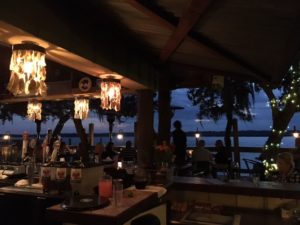
Cap’s on the Water, credit: Katelyn Keating
During June’s MFA residency, I attended an open discussion about the ways writers balance work. Listening to other writers share their stories reminded me of what community is, and that we are students, but we are also writers. We build community in service of our art, and our art serves our community.
I am a thirty-nine-year-old server. People won’t stop asking, what will you do with your degree? My restaurant customers in particular like to ask, so they can reconcile for themselves that their older server must just wait tables in service of a grander purpose. But I’m not stressed out anymore or unhappy in my job. I derive meaning from my writing; my art is separate from my income. And both ventures benefit from this arrangement.
Next year I will turn forty. I am a server. I am a writer.
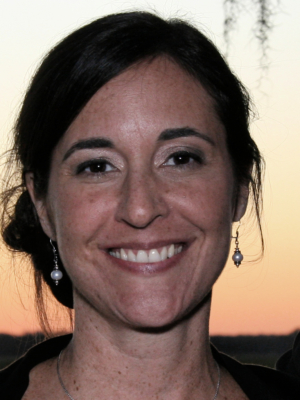 Katelyn believes the Tolkien mantra, “Not all those who wander are lost.” She also concurs with Agent Mulder regarding the location of the truth. She mixes metaphors. Hailing from New England, Katelyn lives in St. Augustine, Florida with her husband, two dogs, three cats, and several of her parents. She is an MFA student in creative writing at AULA. She serves on Lunch Ticket as the fifth Editor-in-Chief, having worked on prior issues as a staff blogger and Editor of Creative Nonfiction and the Diana Woods Memorial Award. Follow her @katelyn_keating.
Katelyn believes the Tolkien mantra, “Not all those who wander are lost.” She also concurs with Agent Mulder regarding the location of the truth. She mixes metaphors. Hailing from New England, Katelyn lives in St. Augustine, Florida with her husband, two dogs, three cats, and several of her parents. She is an MFA student in creative writing at AULA. She serves on Lunch Ticket as the fifth Editor-in-Chief, having worked on prior issues as a staff blogger and Editor of Creative Nonfiction and the Diana Woods Memorial Award. Follow her @katelyn_keating.

